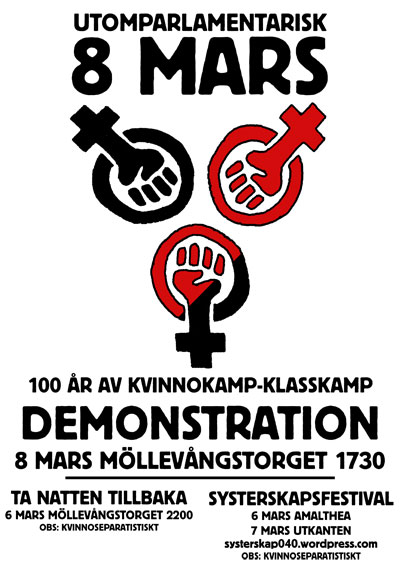Once again, I got to do the poster for the international women’s day celebration in Malmö:
Category: Politics
“News”…
In the news today they were talking about new research results that said that humanity (at least us in the rich parts) are living above our natural resources and because of that we’re basically fucked. And they presented this as news.
I could have told them that when I was seven. They could have come to me 23 years ago and asked. Then maybe we wouldn’t have been as fucked.
But seriously, how can this be presented as news? I’m sure they must have mentioned it on TV in the 80s. Of course, that’s beyond the limit of how far ago people(?) remember things. But they said it again just a couple of years ago.
It is not news. We are fucked. And not in any good way. Stupid TV news.
–
In other news, there are some films coming out soon. Michael Moore is using the C-word, pointing out what the big problem is: Capitalism.
And there’s another film called The End of Poverty that says that the poor parts of the world are paying for the rich parts of the world. Because we are living above our rexources. Man, I could have told them that too when I was seven.
These two films are connected, to each other and to the first item I mentioned, in case that wasn’t already clear. I’m pretty sure I made that connection too when I was seven. It’s really not that hard to get.
And it kind of made me think that we deserve whatever we get in terms of being fucked. When I was seven.
–
Did the old Indians see this? Is that why they didn’t bother to count longer than to 2012? Because they fugured we’d get ourselves fucked right around now?
–
Oh, and maybe I should also mention that I’ll be at the Gothenburg Bookfair this week (Thursday to Sunday) and that my new book (and the old ones of course) will be there as well. Booth number
A02:39. Come check it out.
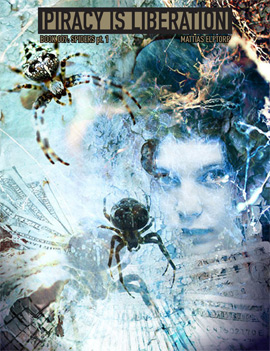
Piracy is Liberation and the Media.
So I’ve written a bit about feminism and collectivity in the world of Piracy is Liberation now. Thought I’d talk a bit about media too.
I’d like to start by paraphrasing Frank Herbert:
Television is the mind-killer.
This may be my own personal opinion, but have you noticed how there’s never anything good on? And still you can get stuck in front of the TV screen for hours, then finally get up and turn it off and feel kind of dirty inside. Like your mind has been infected by something. TV is a media form that tends toward a kind of entertainment that is more concerned with profit than content.
Which is, of course, nothing new. Which in turn makes it even harder for me to understand how it can still hold such influence over our society. Now, before I continue, I should say that I can’t deny there are some TV things that I do enjoy watching. But those things can always be found in other places than the actual TV set, where you can watch them whenever you want instead of at one specific time. But that’s another story.
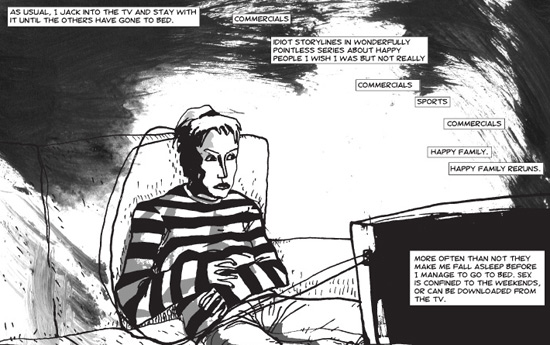
Television in my cyberpunk postapocalypse is a bit exaggerated. In the City, people don’t just watch TV, they jack into it through their TV ports, with cables going directly from the TV into their brains. Indoctrination taken to a whole new level. So the TV transmissions in the comic symbolises more than the role of the actual television in our world. When they cut the transmissions in the comic, it means that they cut the entire means of distribution for the entire machinery of cultural mainstreamification (is that a word? It should be).
Which is what makes it so dangerous. As dangerous as it seems to be to squat a building in sweden, for some reason. And the authorities treat it in much the same way too, with extreme prejudice (re: Piracy is Liberation 006: Violence).
So, another paraphrase:
Death to Television! Long live the new flesh!
Piracy is Liberation and the acting collective.
We live in a society that is very much based on the individual, but a lot of what happens, especially when it comes to events with the potential to change things, are happening on a collective level. It’s all about mass movements (which is probably why the current culture is so centered on the individual, because it makes the status quo easier to maintain).
So another thing I’m trying to do with Piracy is Liberation is to tell the story from a slightly different perspective. Of course, it’s very much about individuals. As a reader, you need characters to relate to in order for the story to work. But my characters are also parts of a greater collective. A collective that may not be visible as such at alla times, but one that is always present. When major changes take place, individual characters may be acting as catalysts, but there is always a collective that makes the real difference.
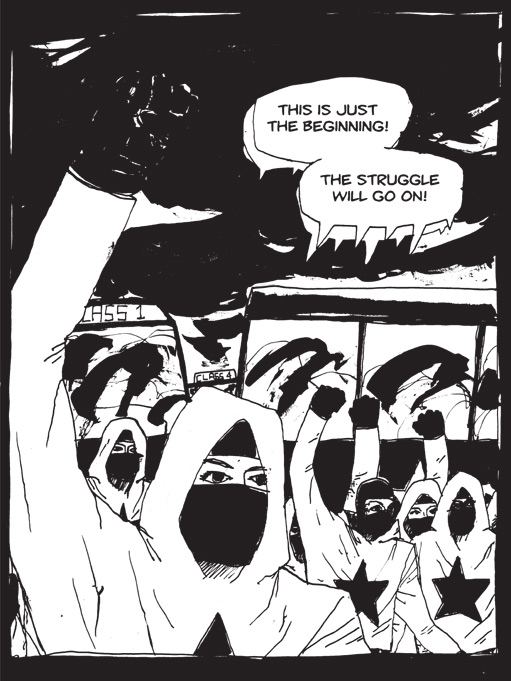
This is something that may not be obvious, but I want it to run in the background, surfacing now and then in the climaxes as seen through the eyes of the individuals taking part in the movements of the story. I’m also trying to convey the feeling of working as a collective. The feeling that anything can be achieved, in a way that I would say you’ll never feel on your own.

Piracy is Liberation and Feminism.
Ok, like this:
There were a lot of issues that I had to consider when I began turning Piracy is Liberation into what it is today. Things I thought I’d like to speak about in the series, but I think that some things can be spoken about by not speaking about them. War is one of those things (how does a world where the concept of war doesn’t exist differ from ours?) that I might go into later. Gender issues is another, and that is what I’d like to talk about now.
I was thinking, should I use Piracy to talk about gender issues that we all live with here today by having the Piracy world be similar to ours, or should I take another approach. I’ve never tried to market Piracy as a feminist comic, but I’ve heard from people who think it is, and I can understand why they think so. Of course, it was my intention, but I wasn’t sure people would notice it and I’m glad they did.
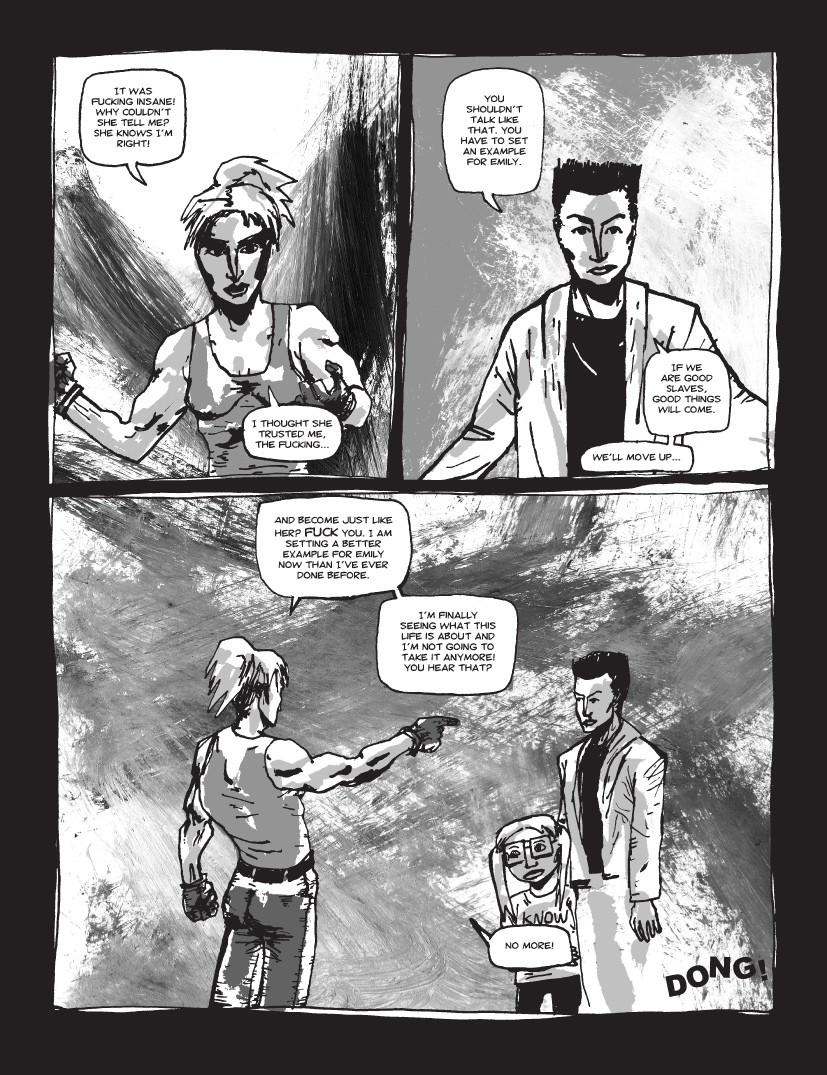
The thing is that there are a lot of stories, fictional and otherwise, that describe our gendered society and talk about inequalities and all that, but there are very few that show what things could be like without that shit. There are also some that turn the tables and present a world where men behave like women and women behave like men, but I’m not really interested in that either. I also have problems with drag sometimes, when it confirms stereotypes rather than question them. It doesn’t really change anything. Quite the opposite, almost.
So I present a world where men and women work under very similar conditions. They are able to do the same things, think the same thoughts, act on the same level. Because physical sex shouldn’t matter and gender (its mental/social counterpart) shouldn’t exist, and I wanted to see what would happen with my story if that was actually the case.
I still wanted the society in the City where the comic takes place to be hierarchical and conservative, but in other ways. It can be conservative when it comes to how we manage our relationships even if it’s gender equal. After all, relationships tend to be hierarchical in one way or another, no matter if they are heterosexual or homosexual, so I don’t think that heterosexuality or gender differences is a prerequisite for that.
After reading this, some may wonder why the opening phrase of the entire series is:
That’s it, stay still, bitch!
with a woman lying under the heel of a man’s boot, but the point in that scene is that the man is a policeman who could just as easily have been a woman. So it has more to do with power and violence and not so much to do with gender.
One final point I’d like to make is that the way I treat the subject in Piracy is Liberation, even though it’s pretty far from most other ficitonal stories produced in this society, is probably more similar to actual reality. Because the image we have of women as passive and men as the acting subjects throughout history can’t possibly be true. I thinks that’s simply another fictional story…
There are only News and Old News.
I went to see the new Star Trek movie today. I liked it, but that’s not what I wanted to talk about here. It (or rather the title) made me think about somsething that I’ve touched upon in Piracy is Liberation.
They didn’t name it Star Trek XI, or even Star Trek: [individual movie title], even though it is the eleventh movie in the series. They named it Star Trek, like the others didn’t count. OK, considering the story in the film, that might be understandable, but I still think we can see some kind of trend here. A trend to ignore the past and make everything seem new.
Same thing with Rambo, Rocky Balboa and others I can’t think of right now. There is a history behind these films, and the contents of the films are building on this history, but in naming and marketing the thing, that history is more or less ignored.
Same thing with many of the remakes that have come in the last couple of years. The Texas Chainsaw Massacre, The Departed, The Ring, Dark Water, Pulse, Dawn of the Dead and lots of others. Remakes of things that came from far away in time and/or space (counted from Hollywood, of course).
Of coursem you might not want to admit that the film you just made is a rermake, because it takes away some artistic merit from it. And there is some logic in making things sound new because of how the media works. News sell, even if they aren’t really news. So it’s understandable in a short-sighted capitalist perspective, but in the long run and a larger perspective, I’m wondering where it will lead (expecially if we see this trend in films and media as a sign of a cultural phenomenon in all of society)…
Samhällsfara…
From The Pirate Bay:
[youtube=http://www.youtube.com/watch?v=6uGoOnfYIBM&eurl=http://thepiratebay.org/special/2009boven.php&feature=player_embedded]
Also, check out this thing, happening around the corner this weekend (found at Det är vi som bestämmer):
[youtube=http://www.youtube.com/watch?v=nOoXp9SJRBc&eurl=http://vibestammer.motkraftblogg.net/]
Dead Prez.
Just came back from the gig. Want noodles. Want more.
[youtube=http://www.youtube.com/watch?v=nXxUsjnCTMs]
Who still gets surprised?
The news (Sydnytt, Sydsvenskan, Aftonbladet, DN, VG, SvD) have been interesting today. It’s about a recently released video made by the police themselves during an event last December, where the cops turn out to be violent racists.
Big surprise.
[youtube=http://www.youtube.com/watch?v=-7URXWvvslY]
They talk just like I imagined they would in a situation like that. I can understand that they need to let out some steam. But when you picture yourself being on the receiving end, being the ones confronting the police, it’s not really the kind of people you want to have to meet. Even if it’s just talk (which, of course, it isn’t, as we’ve seen over and over), it’s downright scary (and scared people make their job easier, of course, but do we want to make their job easier?). Anyway. That’s not the point I wanted to make. The situation is so obvious this time that you only need to see the clip to know what it’s about. The thing I want to talk about is the media.
Swedish media, swedish politicians and swedish police representatives talk almost exclusively about how damaging this is for people’s confidence in the police. As if “we” (ethnic swedes watching the news) all have an interest in keeping “them” (immigrants, ie criminals = not ethnic swedes) friendly and respectful towards the swedish police force. Because it’s important that people trust the police. I think I’m supposed to feel at home in this “we” and share this concern about “their” respect for the forces of Order, but that won’t happen. I’m one of “them” any day.
There’s also been a lot of talk about whether what can be seen on the video is legal or not. Frankly, I don’t give a fuck about that either (although it is a concern that if there was a video of someone talking that way about cops I’m sure it coule be turned against them in court).
Very few, if any, express some kind of worry that this kind of people is the only group in society who are allowed to use violence. That these are people who get away with almost anything, simply because that’s how we organise society. There needs to be a group of people who we all agree are a little better than everyone else, a little bit more trustworthy and noble. Infallible, almost, no matter the evidence to the contrary.
If we were to appoint someone today to a position like that, would we chose these persons, who talk about violently sterilizing people, calling them monkeys because they come from somewhere else or live in a certain area or whatever? I don’t think so. I don’t hope so, at least.
I think I wouldn’t even like to put someone in that position in the first place. It seems kind of dangerous.
Maybe that’s what the discussion should be about?
Ett steg närmare kulturell kollaps…
Precis som videon när den kom på 70-talet förstörde filmbranschen, precis som kassetten när den kom förstörde musikbranschen, så kommer nu fildelningen att förstöra all kulturproduktion. Det enda som kommer att finnas kvar är kultur som produceras för producentens egen skaparglädjes skull. Vad händer med den kommersiella kulturen om vinstintresset tas bort ur beräkningen? Tänk på allt fint som skulle försvinna.
Originaliteten kommer vi också att gå miste om när alla har fri tillgång till vad andra har gjort. Och tänk på allt skräp som kommer att flöda på fildelningsnätverken. Material som inte har prövats genom att behöva godkännas av de stora produktionsbolagen för att se om det är kommersiellt gångbart. Vanliga konsumenter, gratiskonsumenter dessutom, kommer att få avgöra på egen hand vad som är bra och dåligt. Vågar vi verkligen lita på deras omdöme?
Vågar vi dessutom lita på att behovet av kultur fortfarande är så stort att någon kommer att vara beredd att se till att dess kreatörer fortfarande har en försörjning? Vågar vi lita på att företag och/eller stat kan se sig ha ett tillräckligt intresse i att kultur fortsätter produceras?
Vi kan bara hoppas…

